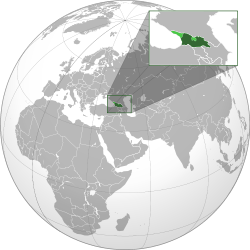Georgia: Saakashvili Loses Control Over TV Remote
By Eurasianet
By Giorgi Lomsadze
When his United National Movement lost control over Georgia’s parliament in early October, Georgian President Mikheil Saakashvili also lost the remote control for the country’s national television broadcasters. In a country that watches TV round-the-clock, that means drastic changes in news coverage.
The United National Movement’s nearly 15-percentage-point loss to Ivanishvili’s Georgian Dream coalition in the October 1 parliamentary vote has produced upheaval in Georgia’s news industry. Station owners, executives and journalists alike have scrambled to adapt to Georgia’s new political reality.
Saakashvili-bashing news channels, previously marginalized, now claim to be gaining access to more viewers and advertisement revenue. Yet political figures – including the new prime minister, Bidzina Ivanishvili – still stand behind the country’s stations, meaning that flipping channels remains the best way for Georgians to get all sides of a story.

“We have a more balanced overall picture now,” commented media critic Ninia Kakabadze. “But we don’t know if the changes in the media environment will change the situation when you need to add the news from both sides and take the average to get a good idea of what’s really going on.”
Out of Georgia’s three national broadcasters – the privately owned Rustavi2 and Imedi, and the government-financed Georgian Public Broadcasting – only Rustavi2, the largest, still appears to be firmly in President Saakashvili’s camp. The post-election trajectories of Imedi and Georgian Public Broadcasting are less clear-cut.
Prior to the election, Imedi was avidly pro-government. But now, the station has been restored for the lari-equivalent of less than $2 to Inna Gudavadze, the widow of its former owner, Badri Patarkatsishvili, an outspoken Saakashvili critic who ran for president in 2008. Gudavadze lost control of Imedi after her husband’s death that same year.
In an interview with the news weekly Liberali, Gudavadze alleged that an unnamed “figure” involved in the struggle over the station’s ownership had called after the October 1 vote and offered her Imedi back. Reasons for the alleged offer were not clear. EurasiaNet.org could not reach Gudavadze for comment in time for publication.
Meanwhile, Georgian Public Broadcasting, long a target of opposition criticism, could prove a similar wild card. By law, both Ivanishvili’s Georgian Dream coalition and President Saakashvili have a say in forming the company’s board of trustees.
The station now appears to be preparing for some form of transformation; a programming makeover includes the closure of its Russian-language satellite-and-cable news broadcaster PIK, long denounced by Ivanishvili supporters as a Saakashvili PR vehicle. PIK’s broadcasts have also riled the Kremlin, and the Georgian Dream government is prioritizing the mending of fences with Russia.
Ultimately, though, the post-election health of Georgian media could come down to survival of the financially fittest.
The limited size of Georgia’s advertising market – about $50 million – “is not enough to sustain the many [existing] television companies and . . . the largest television channels have not been making profits,” underlined media analyst Mathias Huter of anti-corruption watchdog Transparency International Georgia. [Editor’s note: Transparency International Georgia receives funding from the Open Society Georgia Foundation, part of the Soros foundations network. EurasiaNet.org operates under the auspices of the Open Society Foundations in New York, a separate part of the Soros network].
Before the election, some 70 percent of television ad-spends went to pro-government national broadcasters Rustavi2 and Imedi, noted Huter, but today, Ivanishvili-leaning stations are claiming a marked increase in ad revenue. Chief among them is TV9, a satellite-and-cable news station owned by Prime Minister Ivanishvili’s wife, Ekaterine Khvedelidze.
TV9 played an important, possibly critical role in ending the parliamentary majority for Saakashvili’s UNM by offering alternative news coverage during the election campaign. Most notably, TV9 was the first to broadcast footage of brutal abuse in Georgian prisons. The graphic images are believed to have had a profound effect on public opinion on the eve of the elections.
The Ivanishvili family owns not only TV9, but its online offshoot, Info9, as well as a stake in regional television station Trialeti and cable-and-satellite-TV-provider Global TV. Under Georgian law, public officials are banned from owning shares in broadcasting outlets, but close relatives are not.
While conceding that TV9 reporters could become wary of angering Ivanishvili, Executive Director Kakha Bekauri maintains that the station’s ownership will not define its news broadcasts. “An independent television station has to be financially independent first of all,” he said. Thanks to increased ad contracts, Bekauri expects TV9 to recoup its start-up investment and make a profit within a year and half.
But TV9 is not the only newcomer with big bucks behind it. On the other side of Georgia’s political scales stands a proposed TV channel run by Tamar Chergoleishvili, the wife of National Security Council Secretary Giga Bokeria and editor of the pro-libertarian news weekly Tabula. The money for the station comes from Kakha Bendukidze, a millionaire businessman who remains close to Saakashvili.
Together with her associates, mostly Saakashvili loyalists, Chergoleishvili plans to offer viewers “quality debate by quality people” – similar, she says, to Fox News’ “The Five” – on topics related to a free market and individual freedoms, themes she believes Georgian media do not cover adequately.
Standing more in the wings are two stations – Maestro and Kavakasia – that are independently owned. The Tbilisi-based television stations drew 67 percent and 37 percent of their reported 2011 incomes, respectively, from ads for Ivanishvili’s Georgian Dream coalition. They have yet to prove if they can be as critical of the Ivanishvili cabinet as they were of the pro-Saakashvili elite.
Giorgi Lomsadze is a freelance journalist based in Tbilisi.
